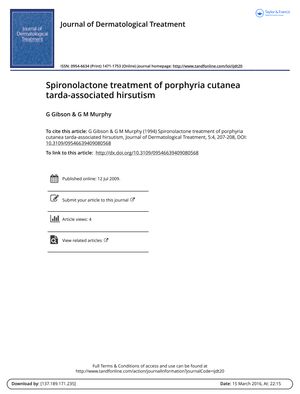Spironolactone Treatment of Porphyria Cutanea Tarda-Associated Hirsutism
January 1994
in “
Journal of Dermatological Treatment
”

TLDR Spironolactone helped reduce excessive facial hair in a woman with porphyria cutanea tarda.
In 1994, Gibson and Murphy reported the beneficial effects of spironolactone on a 38-year-old female patient with porphyria cutanea tarda (PCT)-associated hirsutism. The patient had a history of blistering on her hands and feet and marked facial hirsutism requiring twice-daily shaving. After achieving clinical and biochemical remission of PCT with chloroquine phosphate treatment, her hirsutism persisted. Spironolactone was then administered, starting at 50 mg daily and increasing to 100 mg daily after one month. Within six months, the patient saw a significant improvement in her hirsutism, with reduced shaving frequency and area affected. No side effects were reported from the spironolactone treatment. The study suggests that spironolactone is a useful therapeutic option for women with persistent PCT-associated hirsutism, although it is not a licensed use of the drug and long-term administration should be approached with caution due to potential liver complications associated with PCT.



